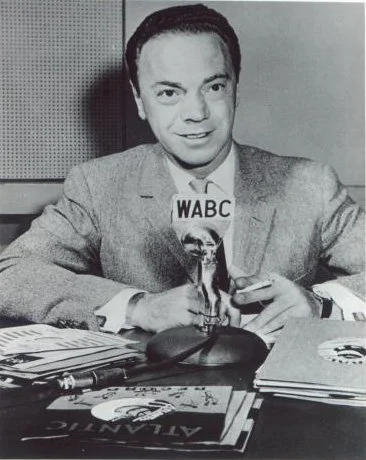U.S. Disc Jockey
Alan Freed. Born Albert James Freed, near Johnstown, Pennsylvania, 21 December 1921. Attended Ohio State University, B.S. in mechanical engineering, 1943; served two years in U.S. Army; disc jockey, WKST, New Castle, Pennsylvania, 1945; radio host, WAKR, Akron, Ohio, 1947; hosted television dance show, WXEL, Cleveland, Ohio, 1950; disc jockey, WJW, Cleveland, Ohio, 1951-54; staged "Big Beat," all-African-American-talent rock and roll shows, 1952-58; hosted Rock 'n' Roll Party, CBS-TV, 1957; disc jockey, WINS, New York City, 1954-58; disc jockey, WABC, New York City, 1958; hosted dance party, WNEW -TV, New York City, 1959; disc jockey, KDAY, Los Angeles, California, 1960; worked at WQAM, Miami, Florida, 1962; jazz disc jockey, KNOB, Los Angeles, California, 1964. Elected to the Rock and Roll Hall of Fame, 1986. Died in Palm Springs, California, 20 January 1965.
Alan Freed
Alan Freed
Alan Freed at WABC, June 1958
Courtesy AP/Wide World Photos
In the 19 50s, Alan Freed became the first nationally recognized disc jockey in the U.S. to feature the emerging rhythm and blues and rock musical forms. During a time when many white "platter pilots" were reluctant to play songs by African-American performers, Freed was not; as a result, he helped to advance the careers of a number of artists. He has also been credited with helping to popularize the term rock and roll.
Freed, who grew up in Salem, Ohio, began his career in radio as an announcer in New Castle, Pennsylvania, after World War II, and by 1949 he had a popular music request show over WAKR in Akron, Ohio. In 1950 he moved to Cleveland and landed a job at WXEL-TV; however, by June 1951 Freed had returned to radio, hosting a record show over Cleveland's WJMO from 6:00 to 7:00 in the evenings. Less than a month later, he moved over to WJW in Cleveland to host what became a very popular late-evening request show.
Although Freed had started playing rhythm and blues on the air while he was in Akron, the inspiration for his career in rhythm and blues came from Joe Mintz, the owner of a Cleveland record store called the Record Rendezvous. Mintz was convinced that a rhythm and blues show would be popular, because both blacks and whites were buying rhythm and blues records in his store. He convinced Freed to give the music a chance on the air, and the result was The Moondog Show, which proved to be a great success.
Freed received wide attention when, in 1952, he took his show on the road. He decided to host a live concert in the Cleveland/Akron area called the Moondog Ball. The show, which featured a variety of acts, drew a crowd of 25,000 people to a 10,000-seat arena, and it was heralded as a successful, though raucous, event. The near riot created by the ticketless crowd outside the theater attracted press attention to the music Freed was playing.
By 1954 WNJR in New Jersey had begun to air taped copies of Freed's programs, and on 1 May he hosted an Eastern Moondog Coronation Ball at the Sussex Avenue Armory in Newark. Years later, the New York Times noted, "Going to one of Alan Freed's rock 'n' roll musicales has always been something like having an aisle seat for the San Francisco earthquake."
Freed moved from Cleveland to New York City in July 1954 after signing with WINS radio for the largest annual salary paid to an independent rhythm and blues jockey up to that point-$75,000. However, blind street musician Louis "Moondog" Hardin objected to Freed's use of the Moondog moniker, and in December of 1954, Hardin won a court injunction against Freed's use of the term. Freed changed the name of his WINS program to Alan Freed's Rock and Roll Party, and the age of rock began.
Freed moved to WABC in 1958, but he lost both his prestigious radio program and a television show at WNEW-TV in 1959 as a result of the Congressional quiz-show investigations. The legal action was prompted by accusations that TV networks were rigging popular quiz shows of the day, but the inquiries shifted to radio after Burt Lane, a representative for the American Guild of Authors and Publishers, sent a letter to the Congressional Special Subcommittee on Legislative Oversight citing examples of commercial bribery. Freed and a number of popular disk jockeys were accused of accepting money from record companies in return for playing those companies' songs on the air. Freed pleaded guilty to a charge of taking bribes in 1962 and subsequently left New York City. Freed died in 1965 at 43 years of age in Palm Springs, California.
Works
-
1947 Request Review
1951-54 The Moon Dog Show
1954-58 Alan Freed's Rock 'n' Roll Party
-
Rock around the Clock, 1956; Don't Knock the Rock, 1956; Rock, Rock, Rock, 1957; Go Johnny Go, 1959

